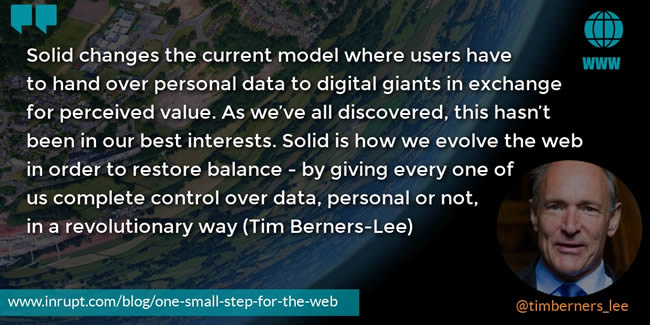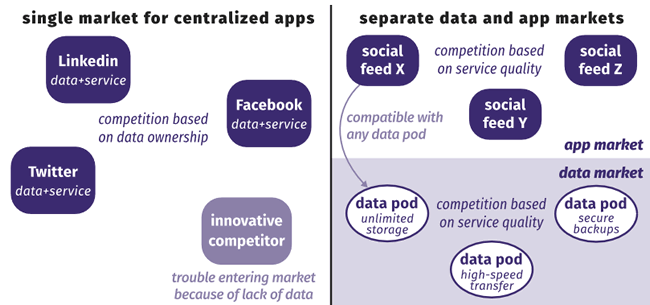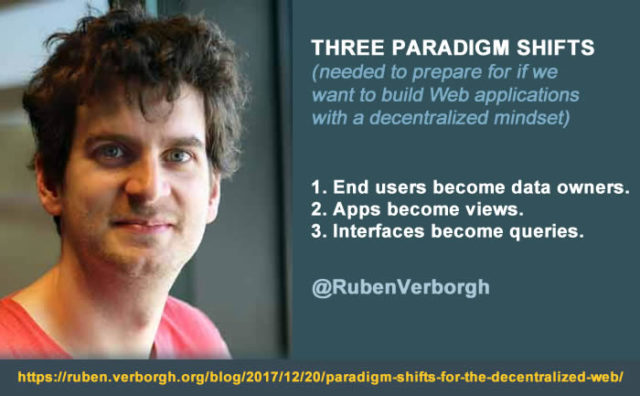In 2017 MIT launched a new project, led by Sir Tim Berners-Lee: Solid. In September 2018, Berners-Lee announced the launch of Inrupt, a start-up that will take the Solid open source platform and “Solid movement” to the next level with the backing of Glasswing Ventures. A look at the what and why.
Tim Berners-Lee, inventor of the World Wide Web (with the help of others such as Belgian Robert Cailliau) doesn’t particularly like the way the web and the internet is evolving.
Inrupt will be the infrastructure allowing Solid to flourish. Its mission is to provide commercial energy and an ecosystem to help protect the integrity and quality of the new web built on Solid (Tim Berners-Lee)
In the Summer of 2018 there were several interviews with the inventor of the WWW where he mentioned Solid and spoke about how he felt about many evolutions such as the centralization of power in the hands of the well-known behemoths such as Google and Facebook, the different Facebook scandals (not just Cambridge Analytica, also remember the psychological experiments affair) and, in general, the threats to his open web view.

Personal data, the decentralized web and technology behemoths
The main issue, however, is that of the power of the few in an age where the web truly has become part of the lives of the many.
Very dubious personal data practices (think Facebook and the telephone numbers, various issues at Google such as the Gmail data sharing to mention some recent examples at the time of writing this), insufficient security and data protection practices (recently again breaches at Facebook), an extremely dominant position of the mentioned and other players (in the case of Google in far more areas as you probably know) and, last but not least, what is being built upon and enabled by the WWW in practice. That’s precisely where Inrupt and Solid come in.
Inrupt wants to change the Web as you know it with developers using the open source Solid platform and an ‘open’ decentralized web approach whereby applications and personal data get separated and you, as a user, have your personal data ‘store’ wherever you want and the apps (built in Solid) connect with those data and also enable you to create data which don’t get stored or controlled by the developer but in your personal open data store (POD).
I’ve always believed the web is for everyone. That’s why I and others fight fiercely to protect it. The changes we’ve managed to bring have created a better and more connected world. But for all the good we’ve achieved, the web has evolved into an engine of inequity and division; swayed by powerful forces who use it for their own agendas (Tim Berners-Lee)
We’ll explain a bit more about all that (and provide the proper links to understand it) below. For now mainly remember personal data and the principle of “personal empowerment for all through data”.
For Inrupt and Berners-Lee that is fundamental to the success of the next era of the web. Another quote to make it a bit more tangible: “Imagine if all your current apps talked to each other, collaborating and conceiving ways to enrich and streamline your personal life and business objectives? That’s the kind of innovation, intelligence and creativity Solid apps will generate. With Solid, you will have far more personal agency over data – you decide which apps can access it”.
Why a different personal data model in a decentralized web – on organizations and regulations
So, personal data, decentralization, uncoupling, applications, a different web approach, and less power for the few big players. Before looking a bit deeper at Inrupt and Solid, let’s answer two questions you might have.
Question one. Are these behemoths and their teams that evil?
They’re doing a job for a company with a mission they believe in. Yet, a company needs to make a profit and is still driven by growth and competition. And your data play a key role there.
Question two, in fact two questions but related.
- Aren’t companies massively investing in better data protection, security and data management overall, not just with regards to the Internet but also with regards to, for example, the Internet of Things?
- And aren’t regulators coming up with personal data protection rules such as the EU GDPR and more regulations to protect data and people and make our ‘digital’ lives safe and secure?
Sure, companies invest (not massively) and regulators come up with rules. Now, regulations aren’t the answer to everything. Moreover, trading in the power of organizations for the sole power of regulators who in some areas of the world clearly work towards such scenarios (which is food for another article) isn’t always the best alternative either.
OK, that’s out of the way. Back to Inrupt and Solid. So, they, nor their founders or financial backers, are against technological evolutions. They won’t protect the world from evil. They don’t operate in a siloed world without rules, politics, governments and regulations that fail to reach their goals. They’re not a bunch of anarchists or freedom fighters (maybe a tiny bit of the latter but we didn’t say that). And they are not going to work against governments. Yet, they do want change, big time. The rest is wait and see.
By storing data ourselves, and only selectively giving apps permission, we are no longer forced to pay with our privacy (Ruben Verborgh)
What is Solid anyway? Digging a bit deeper
So, Solid is an open source platform that aims to lead to a “new generation of web applications that realize Tim Berners-Lee’s “vision of a truly decentralized web”.
Then what is it? From the Solid MIT page: “Solid (derived from “social linked data”) is a proposed set of conventions and tools for building decentralized social applications based on Linked Data principles. Solid is modular and extensible, and it relies as much as possible on existing W3C standards and protocols”. W3C is short for the World Wide Web Consortium (which Tim Berners-Lee founded and where he remains the director, along with the Web Foundation and the Open Data Institute).
What does that mean in practice? We’ve touched upon it earlier and link to more info below, yet, for now more from that Solid home page:
- The ability to develop applications whereby users are free to choose where the data sits and who can and can’t access it because the content is decoupled from the application.
- Since data is decoupled from applications and modular design of applications becomes possible, users can avoid vendor lock-in. So, it doesn’t matter which apps you use and where your personal data is stored (you choose): you can use the data for the various apps.
- The latter in turn means that folks who develop applications can build applications that use data (which, again, you control) created by other applications, which means an ecosystem of apps that can be built faster and can offer entirely new services and possibilities. Think about it this way: you pick the applications you need for whatever purpose and the data you need for the application to work and that is created with the application is in your hands so to speak.

Now, how can this possibly ‘break’ the power of the online behemoths? Well, again: you decide where the data sits and, more importantly, the app and the data are uncoupled, not the folks who built the application. No vendor lock-in in this scope essentially also means that data is not controlled by the Facebook’s and others but by you whereby the data exists in those so-called Solid pods (personal online data stores).
As Fast Company, that broke the news on Inrupt in an exclusive interview with Tim Berners-Lee explains: “These pods are what give Solid users control over their applications and information on the web. Anyone using the platform will get a Solid identity and Solid pod”.
Paradigm shifts for the decentralized Web and more resources and info on Inrupt and its mission
Wait a minute! Does this mean that the power and control over the data and your Solid identity simply gets in the hands of another company, namely Inrupt? Glad you ask because this is precisely where things become a bit more technical and the benefits for both developers and users become clearer.
First things first: there is a registry of trusted and verified Solid Providers. One of them is, indeed Inrupt. Yet, you can install and run your own Solid server: Solid is written in Javascript based on Node.js (more info here). Secondly, as Solid is decentralized it is and will be possible to register and identity and get a POD on a Solid server as is explained here (so, no “central sign-up place”).
For the rest and to understand more we link to a post by a contributor to Solid, Ruben Verborgh.

Ruben Verborgh is a Professor of Semantic Web technology at the Belgian University of Ghent (where you also have quite some artificial intelligence wisdom, spin-offs and other start-ups, which matters here as we’ll see in a next post).
His post is entitled “Paradigm shifts for the decentralized Web” and really explains everything you need to know about the what and how and which possibilities there are etc.
The rest is clearly explained in the interview with Fast Company and in the post by Tim Berners-Lee on the launch of Inrupt. In the meantime, Verborgh also explained the essence of project Solid in layman’s terms on Quora: read it here.
For the business readers among you: Input is backed by $112 Million debut fund artificial intelligence Glasswing Ventures.
And there are quite some interesting people from interesting companies and backgrounds you might want to check out in there. For now, we’ll limit ourselves to one that is in the “Protect Council” of Glasswing whose paths we’ve crossed before: security guru Bruce Schneier.
Funny enough there are also some with an indirect connection to Belgium (does it show that’s where we’re based?) via text-to-speech technology which brings us to another person that has nothing to do with Inrupt as far as we know but whom we wanted to write about originally today after his visit to a Belgian tech event last week, whom we’ve met before and where there is a link with speech technology, again Belgium and something we wanted to write about Google, power and artificial intelligence: Ray Kurzweil. That will become much clearer next time.
What we find interesting is that there is finally a disruptive approach. There isn’t a single doubt in our mind that the power of large technology companies, especially those disposing of a wealth of AI scientists, massive data capabilities and superior computing possibilities should be limited.
If it will work or not: no idea. For now: meet Inrupt, its ambitions and the anything but obvious ways or guaranteed paths to success it needs to take via the several links above. Or simply check out Solid and give it a try. Oh, and about that open web with links and stuff: the web is all about links. Otherwise this post wouldn’t even exist.
Below is the first of a series of videos posted on YouTube on September 29, 2018.

